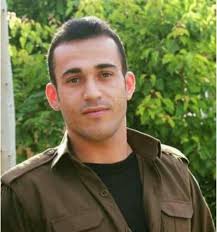Enforced Disappearances of Kurdish Men Arrested After Armed Clashes And Reprisals Against Families Must End Immediately

The Iranian authorities must immediately reveal the fate and whereabouts of five men from Iran’s Kurdish minority who have been subject to enforced disappearances since 23 and 24 June 2017, Amnesty International said today.
Ramin Hossein Panahi, a 22-year-old member of the Komala armed opposition group, was arrested on 23 June 2017 after he took part in armed clashes with Iran’s Revolutionary Guards in the neighbourhood of Shalman, in Sanandaj, Kurdistan Province, northwest Iran. His fate and whereabouts have been unknown since then.
Later that day, the Revolutionary Guards stormed Ramin Hossein Panahi’s parents’ house in the village of Qeruchay, near Sanandaj and arrested his brother, Afshin Hossein Panahi. The following day, Revolutionary Guards raided the house again and arrested three other members of his family – Anvar Hossein Panahi (cousin), Ahmad Hossein Panahi (brother-in-law) and Zobeyr Hossein Panahi (distant relative). Information received by Amnesty International suggests that none of the men arrested had any involvement with the armed clashes and were instead arrested by Revolutionary Guards in an apparent effort to exact retribution and create a climate of fear.
Amnesty International understands that on both days, the arrests were carried out in a violent manner. According to accounts from Ramin Hossein Panahi’s family, armed Revolutionary Guards wearing black masks broke the front door of their family house and beat the men as well as Ramin Hossein Panahi’s sister and elderly father. They also warned them against holding gatherings or giving media interviews. Ramin Hossein Panahi’s family have said that their house is now surrounded by heavily armed guards who are monitoring their movements and preventing neighbours and relatives from paying visits.
Since the men were arrested last week, the authorities have refused to provide any information about their fate and whereabouts. Ramin Hossein Panahi’s family learned through a local source that he was hospitalized in Sanandaj following his arrest for approximately an hour and then moved to an undisclosed location. His family are concerned that he is at risk of extrajudicial execution and torture, including through being denied life-saving medical care for his injuries. No information is available on the other men. Their families reported making strenuous efforts to locate them by visiting various government offices in Sanandaj, Qorveh and Dehgolan, all in Kurdistan Province, but said that officials refused to acknowledge their detention or disclose their location. Instead, they directed threats and insults at them describing their loved ones as “terrorists”.
Amnesty International considers all five men to be victims of enforced disappearance and is calling on the Iranian authorities to immediately reveal their fate and whereabouts. Enforced disappearance is a crime under international law and places individuals at serious risk of extrajudicial execution, torture and other gross human rights violations.
The organization is urging the Iranian authorities to release Afshin Hossein Panahi, Anvar Hossein Panahi, Ahmad Hossein Panahi, and Zobeyr Hossein Panahi if they have been detained solely because of their family connection with Ramin Hossein Panahi. The authorities must ensure that Ramin Hossein Panahi is promptly brought before a judge, as well as provided with immediate access to healthcare, protected from torture and other ill-treatment, given access to an independent lawyer of his choosing, and granted a fair trial without resort to the death penalty.
Background
In addition to Ramin Hossein Panahi, three other men affiliated with the armed Kurdish opposition group Komala were involved in the exchange of gunfire on 23 June 2017. They included Sabah Hossein Panahi, Hamed Seyf Panahi and Behzad Nouri. Ramin Hossein Panahi was injured and subsequently arrested while the latter three were shot dead. The exchange of gunfire apparently started at a Revolutionary Guards checkpoint after the men were identified while travelling in a car and did not heed a call to stop. The authorities have refused to return the dead bodies of the three men to their families for burials and warned the families against holding memorial gatherings. Komala has claimed that six members of the Revolutionary Guards were also killed during the clashes but the Revolutionary Guards have not acknowledged any casualties in the official statement they issued on 23 June.
Komala is an armed Kurdish opposition group which has been engaged in armed activities against the Islamic Republic of Iran since the 1980s.
Kurds are one of Iran’s disadvantaged ethnic minorities who face entrenched discrimination that curtails their access to employment, adequate housing and the exercise of their cultural, economic, civil and political rights. Continued economic neglect of provinces populated by Kurds, which include Kurdistan, Kermanshah and parts of West Azerbaijan, have further entrenched poverty and marginalization. Politically, Iran’s Kurdish minority have criticized the centralization of political life and the absence of any measures to ensure minority self-government.